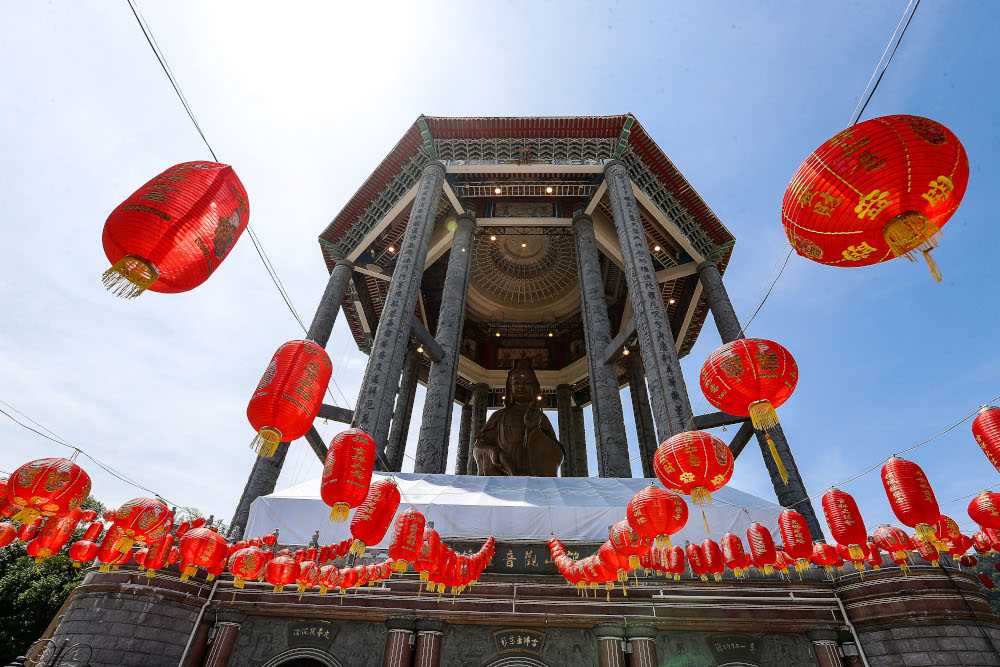
IPOH, Feb 6 — With the movement control order (MCO) extended till February 18, some Malaysians are opting for a virtual celebration this Chinese New Year since their annual hometown pilgrimage is now out of the question.
Those interviewed by Malay Mail said the ban on home visits have put a damper on the festivities, forcing them to scale back their initial plans for the reunion dinner this February 11, and relying instead on video calls to family and loved ones for the rest of the long weekend public holiday.
A common wish many shared is for a stable internet connection on that day.
“Since we can’t travel to our hometown this year, we can only meet our family via video call. But for that, the internet line should be good. The connection has been poor lately in my area,” said Jane Lee, a clinical psychologist who hails from Perak but is based in Selangor.
The 24-year-old also said that she is resigned to not attending the traditional reunion dinner with her family on the eve of Chinese New Year as the Covid-19 pandemic shows no signs of letting up.
“Since this pandemic started, we have missed out on a lot of things, with Chinese New Year family dinner being just one example. We already expected this would happen,” she said.
Chow Lee Li, 30, another Perakian who currently works in Kuala Lumpur, said her siblings have planned a group video call with her parents on the first day of Chinese New Year.
“As we grow older, Chinese New Year has greater significance for us. It is about family coming together, despite the busy lives that we lead during the rest of the year.
“Time never stops, and parents never stop getting older. At the end of the day, we know that companionship and time are the best gifts that we, as children, can give our parents,” she said.
Chow also said that she will miss the Hakka dishes usually prepared by her mother for the occasion.
“We are very traditional, and we always eat at home. We never book a table at a restaurant. Our home on Pangkor Island is more of a village style and I will miss the generous Hakka spread.
“However, we are also planning to have a reunion dinner via video call so that we can feel like we are eating together in one place,” she added.
When asked how she is planning to distribute ang pau, Chow said she will rely on sending the money via bank transfer, as “in my village, Boost or Touch ‘n Go apps are no more popular than automated teller machines (ATM).”

Home is where the heart is
Amanda Yeap, 29, who is currently working as a sub-editor in Singapore, said that she will be celebrating Chinese New Year with her extended family there.
“I will be celebrating with my father’s cousin and his family. It’s my first time celebrating away from my immediate family.
“My sister and I, who are both based in Singapore, will be video calling our parents for sure, especially during the reunion dinner,” she said.
“It’s been an emotional time for me because I just realised that I haven’t seen my parents in over a year, the last time being the previous Chinese New Year,” she added.
Lavery Lau who is working as a human resources executive in Penang said this will be the fourth consecutive year that she has skipped reunion dinner with her family.
“I didn’t go home for Chinese New Year celebrations for the last three years and this year will be the same due to Covid-19.
“I will probably call my parents and share the food that we have prepared for the celebration in our family group chat on WhatsApp,” the 31-year-old from Perak said.
Gifts from far away is possible with apps
Penang-based insurance agent Irene Goh, whose parents are in Sungai Petani, Kedah will be ordering food delivery for her parents and sending them hampers.
Previously, Goh, her husband and two children would spend the first day of Chinese New Year in Sungai Petani.
“This year, we won’t be able to do that so I am now searching for restaurants that can deliver food there for my parents,” she said.
She said they will have to meet her parents “virtually” during Chinese New Year.
Usually, Chinese New Year in Sungai Petani is a big affair with up to 10 family members gathered together for the celebration.
This year, Goh said there will probably be only six there as her brother lives there too while she and her family can only join them virtually.
As for ang pau, she said if the MCO ends after February 18, she will personally hand out the ang paus then.
She felt that the e-wallet transfer is too impersonal and cold.
For Pung Tzyy Ling, 36, who is based in Kuala Lumpur, this would be the second year she would not be sitting down to reunion dinner with her parents and siblings at their home in Kota Kinabalu.
The Sabahan married in September 2019 and celebrated the first Chinese New Year as a newly-wed last year with her husband’s family in Penang.
They had planned to alternate their annual celebrations between the two states and this year was supposed to be her turn to play host to her husband and his family.
Now separated from both sets of parents, the trained pharmacist has instead taken to convey her affection to them through cakes and cookies through delivery services in the two states while she and her husband cook their own “reunion dinner”.
“We won’t be cooking a feast, we will cook the easiest, steamboat,” she said.
Like many of the others interviewed, Pung too said she won’t be sending ang pau money by way of e-wallets.
“I only transfer funds to my parents for their pocket money,” she said.

A very muted CNY
Photographer Chan Boon Kai, 39, said his wife and newborn son are in Alor Setar, Kedah while he is in Penang with their six-year-old son.
“My wife spent her confinement in Alor Setar with her family and continued to stay there due to the MCO,” he said.
Chan said the initial plan was for him to travel with his elder son to Alor Setar for the reunion dinner and Chinese New Year celebrations when the MCO was lifted, which was supposed to happen on February 5, until it was extended to February 18.
“Now that the MCO is extended, we are not sure what to do, I still have to go pick up my wife and baby from Alor Setar as they are due for a checkup in the hospital here this month,” he said.
He hoped to get a police permit to drive to Alor Setar to pick up his wife and baby to bring them back to Penang for their check up and the baby’s vaccination.
“Maybe I will take a day to drive there to pick them up and drive back here before Chinese New Year, if I can get the police permit,” he said.
But Chan also thinks he might skip the reunion dinner and have a quiet meal with his elder son and his mother in Penang instead.
“My mother is staying with me so we will be having our own reunion dinner here with only three of us while my wife will have the reunion dinner with her family there separately,” he said.
He added that with only three people at home, there had not been much preparation for Chinese New Year.
“People can’t visit anyway because of the MCO so there is no point to do anything much or to decorate,” he said.
It will be a far cry from the celebration of previous years where more than 12 people will be gathered in one place for the reunion dinner, he said.
He said likely there will only be around five people at the reunion dinner in Alor Setar this year too since other relatives will not be able to travel back.
When asked if he will be using e-wallets to send ang pau money to relatives, Chan said it will not be as meaningful.
“The whole point of giving ang pau is the gesture of it and we only give when people come to our house but since people won’t be visiting, we will probably be giving out less ang pau this year,” he said.

Similarly, a 29-year-old marketeer, who only wanted to be known as Chris, said that he will meet his relatives in Kuala Lumpur for Chinese New Year as he can’t travel to Ipoh.
“Also, my family didn’t make any dinner bookings for Chinese New Year because we anticipated the extension of the MCO,” he said.
“I initially planned to visit my relatives for the Chinese New Year, but since now the government only allow celebrations within the same family, I guess I have to celebrate with my wife alone this year at our house,” he said.
Liew Yong Ji who is working in Kuala Lumpur, had hoped there would be some leeway to the MCO so he could hold a small gathering with his siblings living in the same city and group video call their parents in Ipoh since inter-state travel is banned.
After learning that the federal government is disallowing even small get-togethers for family living nearby, the 34-year-old resigned himself to just planning for next year’s Chinese New Year.
“Probably I will just be at my home and order food via delivery since I can’t even visit my siblings who are in Kuala Lumpur for the reunion dinner now.
“The best part of Chinese New Year is gathering with family and meeting the loved ones regardless of how far we stay or how busy we are.
“But since the government has implemented the new SOP, we will just do the reunion dinner next year. We pray and hope the Covid-19 cases will reduce in the next few months,” he said.
Miko Kok, 41, a senior reporter currently stationed in Sitiawan, Perak is another person who will be spending Chinese New Year alone.
“My parents and brothers are in Bukit Mertajam and they will have reunion dinner together. Looks like I only can celebrate via video call.
“This is the first time that I will be missing the reunion dinner. Honestly, I feel really sad. I miss my mother’s cooking and wanted to go back, but where I’m currently staying has been declared a red zone and interstate travel is banned,” she said.
Kok also said that she advised her parents to save the ang pou money this year due to the uncertain economic climate. - malaymail


No comments:
Post a Comment
Note: Only a member of this blog may post a comment.